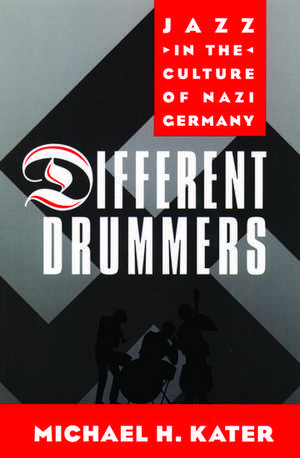Different Drummers: Jazz in the Culture of Nazi Germany
Autor Michael H. Kateren Limba Engleză Paperback – 29 mai 2003
Preț: 330.63 lei
Nou
Puncte Express: 496
Preț estimativ în valută:
63.27€ • 65.68$ • 52.76£
63.27€ • 65.68$ • 52.76£
Carte tipărită la comandă
Livrare economică 11-17 martie
Preluare comenzi: 021 569.72.76
Specificații
ISBN-13: 9780195165531
ISBN-10: 0195165535
Pagini: 320
Ilustrații: numerous halftones
Dimensiuni: 153 x 238 x 21 mm
Greutate: 0.45 kg
Editura: OUP OXFORD
Colecția OUP Oxford
Locul publicării:Oxford, United States
ISBN-10: 0195165535
Pagini: 320
Ilustrații: numerous halftones
Dimensiuni: 153 x 238 x 21 mm
Greutate: 0.45 kg
Editura: OUP OXFORD
Colecția OUP Oxford
Locul publicării:Oxford, United States
Recenzii
"In this admirable and well-researched study, Michael Kater explores the ambiguous relationship that jazz had to the National Socialist state and society, and in the process problematizes the liberating qualities that jazz supposedly possesses. Even more significantly, the manner of the new cultural hsitory, Kater uses his study to illuminate and investigage a number of social, political and cultural issues that engage the interests of specialists in the period."--German Studies Review
"Outstanding....a fine mix of archival research with the collection of oral and written testimonies. It is virtually encyclopedic in its effort to convey the life stories of so many contributors to German jazz; to evaluate the sound of particular musicians; to analyze the audience--generally urban, young, middle-class--and the business; to identify the personal connections and the main locales."--American Historical Review
"Most people would assume that jazz was completely stamped out at home by the fascist government in the 1930s. Michael Kater's remarkable book paints a very different picture and deals in great detail with a little-known chapter in jazz history....There is not a jazz fan, no matter how knowledgeable, who will fail to learn a great deal by reading this important book."--Scott Yanow, Jazziz
"Kater's superbly researched story is fascinating and horrifying, yet in a sense rewarding, since it shows the lengths to which young Germans would go to keep the faith with a music that was their common link."--The Los Angeles Times
"Richly rewarding, challenging, provocative, and eminently insightful."--The Jazz Report
"Meticulous scholarship and...astute use of oral testimony."--London Times Higher Education Supplement
"Outstanding....a fine mix of archival research with the collection of oral and written testimonies. It is virtually encyclopedic in its effort to convey the life stories of so many contributors to German jazz; to evaluate the sound of particular musicians; to analyze the audience--generally urban, young, middle-class--and the business; to identify the personal connections and the main locales."--American Historical Review
"Most people would assume that jazz was completely stamped out at home by the fascist government in the 1930s. Michael Kater's remarkable book paints a very different picture and deals in great detail with a little-known chapter in jazz history....There is not a jazz fan, no matter how knowledgeable, who will fail to learn a great deal by reading this important book."--Scott Yanow, Jazziz
"Kater's superbly researched story is fascinating and horrifying, yet in a sense rewarding, since it shows the lengths to which young Germans would go to keep the faith with a music that was their common link."--The Los Angeles Times
"Richly rewarding, challenging, provocative, and eminently insightful."--The Jazz Report
"Meticulous scholarship and...astute use of oral testimony."--London Times Higher Education Supplement
Notă biografică
About the Author: Michael H. Kater is Distinguished Research Professor of History at York University in Toronto. He is the author of numerous books, among them The Nazi Party and Doctors Under Hitler.
















